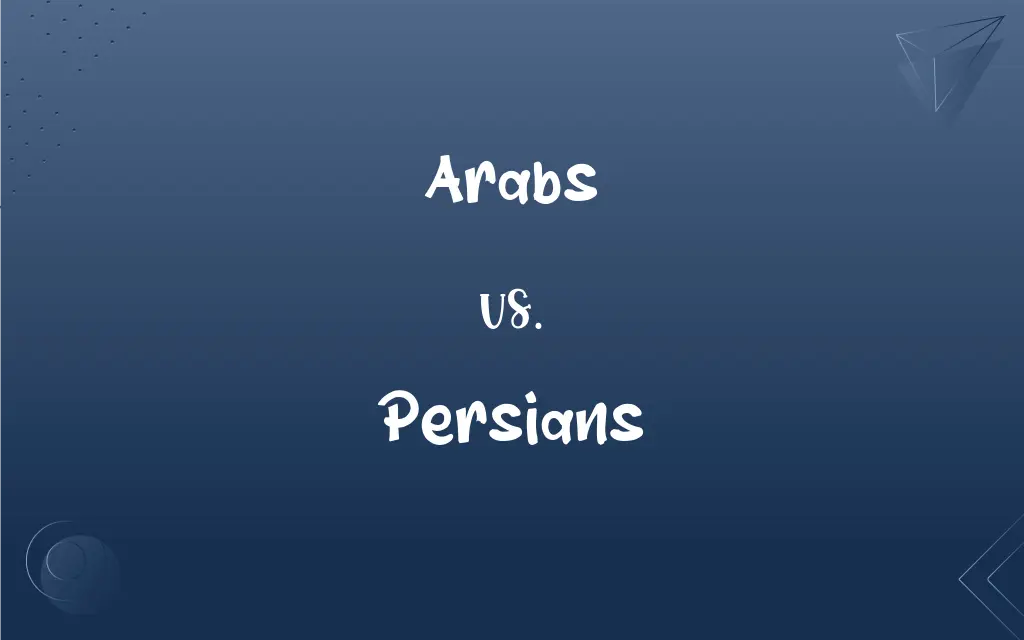Arabs vs. Persians: What's the Difference?
Edited by Aimie Carlson || By Janet White || Published on February 22, 2024
Arabs are a major ethnolinguistic group primarily from the Arab world, while Persians are an ethnic group from Iran with a distinct language and culture.

Key Differences
Arabs and Persians are distinct ethnic groups with unique cultural and linguistic identities. Arabs, primarily found in the Arab world, encompassing 22 countries in the Middle East and North Africa, are united by the Arabic language and culture. Persians, originating from Iran, have their own language, Persian (Farsi), and a rich cultural history distinct from Arab culture.
The Arabic language, a central element of Arab identity, is a Semitic language and has numerous dialects across different Arab countries. Persian (Farsi), the primary language of Persians, belongs to the Indo-European language family and has its own script, which is a variant of the Arabic script.
In terms of religion, the majority of Arabs are Muslims, but there are also significant Christian and other minority religious communities among Arabs. Persians are predominantly Shia Muslims, although there are minorities of other faiths in Iran.
Historically, Arabs have been influential in the spread of Islam and the establishment of various caliphates, impacting a large region in terms of language, culture, and religion. Persians have a history that dates back to ancient times, with the Persian Empire being one of the most powerful historical civilizations, known for its contributions to art, architecture, and literature.
Culturally, Arab societies have contributed significantly to science, literature, and architecture in the Islamic Golden Age, while Persian culture is renowned for its poetry, Persian miniature art, and architectural innovations, including the design of gardens and domes.
ADVERTISEMENT
Comparison Chart
Geographic Origin
Arab world (22 countries in Middle East and North Africa)
Iran
Language
Arabic (Semitic language)
Persian (Farsi, Indo-European language)
Religion
Mostly Islam with Christian and other minorities
Predominantly Shia Islam, with other minorities
Historical Impact
Spread of Islam, establishment of caliphates
Persian Empire, contributions to art and literature
Cultural Contributions
Contributions in science, literature, and architecture
Renowned for poetry, art, and architectural designs
ADVERTISEMENT
Arabs and Persians Definitions
Arabs
United by the Arabic language.
Arabic, spoken by Arabs, is a key element of their cultural identity.
Persians
Speakers of the Persian (Farsi) language.
The Persian language, spoken by Persians, has a rich literary tradition.
Arabs
A major ethnolinguistic group primarily from the Arab world.
The Arabs have a rich cultural heritage that spans over many countries.
Persians
An ethnic group primarily from Iran.
Persians have a distinct cultural identity centered around Iran.
Arabs
Predominantly Muslims with significant religious diversity.
Despite being mostly Muslim, Arabs include diverse religious communities.
Persians
Predominantly followers of Shia Islam.
Most Persians practice Shia Islam, which is a key aspect of their cultural identity.
Arabs
Known for their contributions during the Islamic Golden Age.
Arabs made significant advancements in science and philosophy.
Persians
Known for contributions in poetry, art, and architecture.
Persian culture is celebrated for its poetry, like the works of Hafez and Rumi.
Arabs
Encompassing diverse cultures and traditions across 22 countries.
Arabs from different regions exhibit a variety of cultural practices.
Persians
Heirs to the ancient Persian Empire's legacy.
Persians are proud of their heritage from the Persian Empire.
Arabs
A member of a Semitic people inhabiting Arabia, whose language and Islamic religion spread widely throughout the Middle East and northern Africa from the seventh century.
Persians
Of or relating to Persia or Iran, or to their peoples, languages, or cultures.
Arabs
A member of an Arabic-speaking people.
Persians
A native or inhabitant of Persia or Iran.
Arabs
An Arabian horse.
Persians
The western dialect of this language that is the national language of modern Iran. Also called Farsi.
Persians
The eastern dialect of this language spoken in Afghanistan and Pakistan. Also called Dari.
Persians
A domestic cat of a large breed originally from the Middle East, having a long flowing coat and a broad head with a snub nose.
FAQs
Who are the Arabs?
Arabs are an ethnolinguistic group primarily from the Arab world.
What are some cultural contributions of Arabs?
Arabs have contributed significantly to science, literature, and architecture, especially during the Islamic Golden Age.
What regions do Arabs inhabit?
Arabs inhabit the Middle East and North Africa, encompassing 22 countries.
Are all Arabs Muslim?
While many Arabs are Muslim, there are also Christian and other religious communities among them.
Who are the Persians?
Persians are an ethnic group primarily from Iran.
What is the primary language of Arabs?
The primary language of Arabs is Arabic.
What language do Persians speak?
Persians speak Persian, also known as Farsi.
What are notable cultural aspects of Persian society?
Persian culture is renowned for its poetry, art, and architectural innovations.
Can Arabs and Persians be distinguished by their appearance?
Physical appearances can vary widely among both Arabs and Persians due to the diversity within each group.
Has Persian literature had an impact outside of Iran?
Yes, Persian literature, especially poetry, has had a significant impact on literature and culture in many countries.
How has the history of the Arab world influenced its contemporary culture?
The history of the Arab world, including the spread of Islam and the establishment of various caliphates, has deeply influenced its contemporary culture, language, and social norms.
Are there significant differences in traditional clothing between Arabs and Persians?
Yes, traditional clothing varies, reflecting the distinct cultural identities of Arabs and Persians.
What is the predominant religion among Persians?
The majority of Persians practice Shia Islam.
What is the historical significance of Persians?
Persians have a rich history dating back to the ancient Persian Empire.
Are Persian contributions to global culture significant?
Yes, Persian contributions in poetry, art, and architecture are globally recognized and celebrated.
Do Arabs and Persians share similar cuisines?
While there are some similarities, each cuisine has unique dishes and flavors characteristic of their cultures.
How does the role of religion differ between Arabs and Persians?
Religion plays a significant role in both Arab and Persian societies, but the predominance of Shia Islam in Iran is a key distinction.
Is Arabic related to Persian linguistically?
No, Arabic is a Semitic language, while Persian is an Indo-European language.
Is the Persian Empire part of Arab history?
The Persian Empire is distinct from Arab history, having its own unique legacy and cultural impact.
Do Arabs and Persians interact culturally and politically in the modern world?
Yes, there is interaction between Arabs and Persians, both culturally and politically, but this interaction is complex and influenced by historical, religious, and geopolitical factors.
About Author
Written by
Janet WhiteJanet White has been an esteemed writer and blogger for Difference Wiki. Holding a Master's degree in Science and Medical Journalism from the prestigious Boston University, she has consistently demonstrated her expertise and passion for her field. When she's not immersed in her work, Janet relishes her time exercising, delving into a good book, and cherishing moments with friends and family.
Edited by
Aimie CarlsonAimie Carlson, holding a master's degree in English literature, is a fervent English language enthusiast. She lends her writing talents to Difference Wiki, a prominent website that specializes in comparisons, offering readers insightful analyses that both captivate and inform.































































